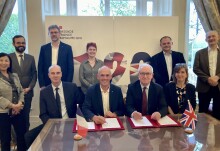

Imperial goes all out for this year’s RAC Future Car Challenge - News
See also:
Related news stories:
Monday 31 October 2011
by Colin Smith
From competing in an all-electric supercar to helping to calculate who has won the race, Imperial College London is involved in many facets of one of the UK’s premiere “green” motoring events.
The Royal Automobile Club, Britain’s oldest motoring organisation, will hold the RAC Future Car Challenge to test more than 60 cutting-edge low emission vehicles from Brighton to London on Saturday 5 November 2011. Instead of getting to London in the fastest time, the aim of this competition is for teams to make it to the capital using the least amount of energy, to find which car is the most sustainable. Low emission cars involved in the Challenge include high performance diesel and petrol engines, and vehicles powered by batteries, fuels cells and hybrid combustion engine/electric motors.
Imperial academics, students and alumni are lending a hand to assess, judge and compete in the Challenge, while others could be using data for their PhD research.
Dr Ricardo Martinez-Botas, from the Department of Mechanical Engineering at Imperial, who will be one of the technical judges for the Challenge, says:
“This is the second year of the Future Car Challenge Competition and it is great to see Imperial so involved at all levels. Imperial has a strong track record in low emission vehicle research. Apart from being an absolute blast, we hope this event can help people to see the benefits of energy efficient vehicles. In these financially challenging times, where petrol is so expensive, people might be interested to see how efficient the next generation of vehicles can be. For instance, we predict the electric cars in the Challenge may cost £1.60 to ‘fill’ up for the whole journey.”
The Racing Green Endurance (RGE) team, consisting of Imperial alumni, will enter their all-electric Radical SRZero supercar in the Challenge. Last year, they drove the SRZero down the entire length of the Pan American Highway to showcase the benefits of electric powered vehicles. The RAC challenge will provide the team with an opportunity to demonstrate the advantages of electric vehicles on home turf.

The first London to Brighton run in 1910 showcased the most cutting edge motoring technology of its day. One hundred years on, the cars are still the most advanced for their day.
Professor Nigel Brandon, Director of imperial’s Energy Future’s Lab, plans to be one of the RGE co-drivers for part of the journey. He says:
“The first London to Brighton run in 1910 showcased the most cutting edge motoring technology of its day. These early cars were really advanced for their time. So advanced, that petrol stations were not even invented. Instead, drivers had to buy fuel from the local chemist! One hundred years on, it is great to see the RAC showcasing today’s most cutting edge automotive technology. I look forward to taking part in this Challenge, which promises to be a lot of fun.”
If you would like to find out where you can meet the RGE team when they complete the Challenge click here for more details.
Postgraduates from the College will be on hand to help the judges to work out which team has won the Challenge when the cars arrive in Mayfair, London. The Imperial students will analyse information from data loggers attached to each vehicle, which gather information about energy consumption. Sensor technology, developed by researchers from Imperial's Centre for Transport Studies, will also be used to validate this information collected by the data loggers and help the Imperial students to calculate the fuel consumption of combustion engine cars from tailpipe emissions.
Mr Clemens Lorf, postgraduate from the Department of Mechanical Engineering who is sponsored by the Grantham Institute for Climate Change, could use data collected on the day to help him with his PhD research on low emission vehicles. The Imperial postgraduate is working on how low emission vehicles perform and how driver behaviour can affect fuel efficiency.
In the lead up to the Challenge, researchers from Imperial’s Faculty of Engineering have also been helping the RAC to set up the event, providing technical advice via seminars and one-to-one consultations with teams to make sure that vehicles meet the strict entry regulations.
After the winners have been announced, all cars will parade at the RAC’s Regent Street Motor Show on the same day. The RGE vehicle will be displayed alongside an all-electric superbike, which has been developed by undergraduates from the Department of Mechanical Engineering at Imperial. Crowds of up to 250,000 people are expected to come and see these low emission vehicles, which will be joined by 300 vintage cars before they are driven the following day in The London to Brighton Veteran Car Run.
Article text (excluding photos or graphics) available under an Attribution-NonCommercial-ShareAlike Creative Commons license.
Photos and graphics subject to third party copyright used with permission or © Imperial College London.





